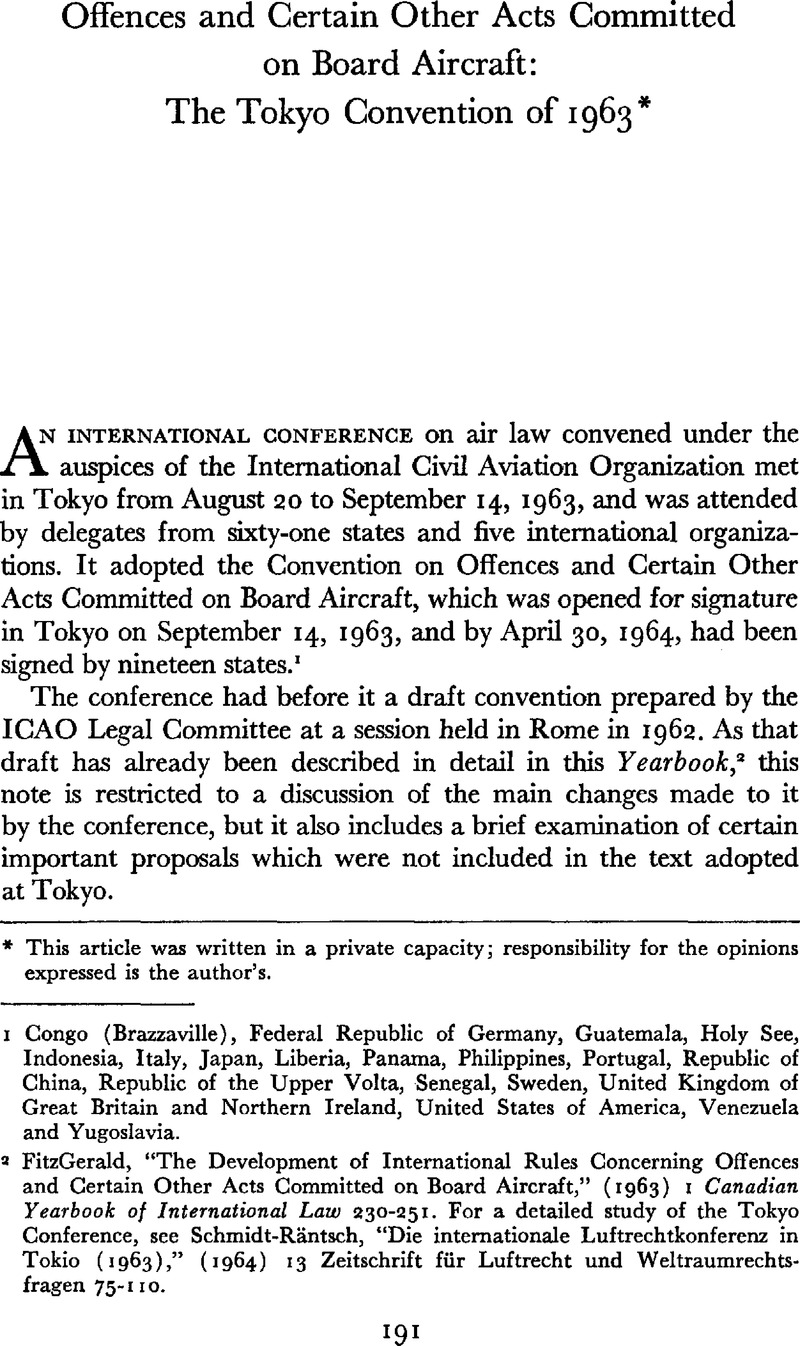Published online by Cambridge University Press: 09 March 2016

This article was written in a private capacity; responsibility for the opinions expressed is the author’s.
1 Congo (Brazzaville), Federal Republic of Germany, Guatemala, Holy See, Indonesia, Italy, Japan, Liberia, Panama, Philippines, Portugal, Republic of China, Republic of the Upper Volta, Senegal, Sweden, United Kingdom of Great Britain and Northern Ireland, United States of America, Venezuela and Yugoslavia.
2 FitzGerald, , “The Development of International Rules Concerning Offences and Certain Other Acts Committed on Board Aircraft,” (1963) 1 Canadian Yearbook of International Law 230–251 Google Scholar. For a detailed study of the Tokyo Conference, see Schmidt-Räntsch, , “Die internationale Luftrechtkonferenz in Tokio (1963),” (1964) 13 Zeitschrift für Luftrecht und Weltraumrechtsfragen 75–110.Google Scholar
3 Among the supporters of the proposal were the delegations of the Polish People’s Republic and the Union of Soviet Socialist Republics.
4 In this regard, the Rome draft was based, in part, on article 3(b) of the Convention on International Civil Aviation. For the text of this Convention, see Canada Treaty Series, No. 36 (1944) at 34; 61 U.S. Stat. 1180; T.I.A.S. No. 1591; 15 U.N.T.S. 295 (1948).
5 The expression “pilot-in-command” is found in some Annexes to the Convention on International Civil Aviation. See, for example, paragraph I.I of International Standards and Recommended Practices-Personnel Licensing-Annex ι to the Convention on International Civil Aviation-Fifth Edition-November 1962. The definition given there resembles the one deleted from the Rome draft and reads as follows: “Pilot-in-command. The pilot re-sponsible for the operation and safety of the aircraft during flight time.”
6 That the article on the forcible seizure of aircraft is a timely one is indicated by two hijackings of civil aircraft that took place after the Tokyo Conference : (1) On November 28, 1963, a Venezuelan airliner was hijacked in Venezuela with 17 persons aboard and flown to neighbouring Trinidad : see the Montreal Star, November 28, 1963, at 1, cols. 1–2. (2) On February 18, 1964, a Piper Apache which had left Miami for Key West landed in Havana. The two Cuban passengers had forced the pilot to change his destination: see La Presse, Montreal, February 19, 1964, at 1, cols. 8–9.
7 Artide 77 of the Chicago Convention provides, in part, that the ICAO Council (a a7-nation body) “shall determine in what manner the provisions of this Convention relating to nationality of aircraft shall apply to aircraft operated by international operating agencies” which might be constituted by two or more states. The Council has expressed the view that “a determination made by the Council pursuant to Article 77 of the Chicago Convention will be binding on all Contracting States if the determination is made within the scope of the authority given to the Council by that Article.” See ICAO Doc. 8124–C/928, Action of the Council-Forty-first Session-Montreal 29 September-14 December 1960, at 17 and 32.
8 By the Yaoundé Convention of March 18, 1961, a group of eleven African states constituted a joint air transport undertaking known as “Air Afrique,” The aircraft of this agency are registered in the Ivory Coast.
9 For an explanation of this recommendation of the subcommittee, see ICAO LC/SG “Resolution B” No. 13, March 39, 1963. Subcommittee on Resolution of the Guadalajara Conference (Montreal, March 1963) 6–7, paras. 11–16.